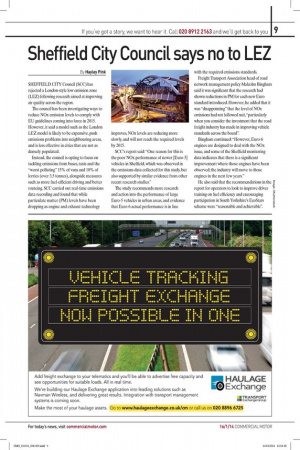Sheffield City Council says no to LEZ
Page 7

If you've noticed an error in this article please click here to report it so we can fix it.
By Hay* Pink
SHEFFIELD CITY Council (SCC) has rejected a London-style low emission zone (LEZ) following research aimed at improving air quality across the region.
The council has been investigating ways to reduce NOx emission levels to comply with EU guidelines coming into force in 2015. However, it said a model such as the London LEZ model is likely to be expensive, push emissions problems into neighbouring areas, and is less effective in cities that are not as densely populated. Instead, the council is opting to focus on tackling emissions from buses, taxis and the "worst polluting" 15% of vans and 10% of lorries (over 3.5 tonnes), alongside measures such as more fuel-efficient driving and better routeing. SCC carried out real-time emissions data recording and found that while particulate matter (PM) levels have been dropping as engine and exhaust technology
improves, NOx levels are reducing more slowly, and will not reach the required levels by 2015.
SCC's report said: "One reason for this is the poor NOx performance of newer [Euro-5] vehicles in Sheffield, which was observed in the emissions data collected for this study, but also supported by similar evidence from other recent research studies." The study recommends more research and action into the performance of large Euro-5 vehicles in urban areas, and evidence that Euro-6 actual performance is in line
with the required emissions standards.
Freight Transport Association head of road network management policy Malcolm Bingham said it was significant that the research had shown reductions in PM for each new Euro standard introduced. However, he added that it was "disappointing" that the level of NOx emissions had not followed suit, "particularly when you consider the investment that the road freight industry has made in improving vehicle standards across the board".
Bingham continued: "However, Euro-6 engines are designed to deal with the NOx issue, and some of the Sheffield monitoring data indicates that there is a significant improvement where those engines have been observed; the industry will move to those engines in the next few years."
He also said that the recommendations in the 7, report for operators to look to improve driver training on fuel efficiency and encouraging participation in South Yorkshire's EcoStars scheme were "reasonable and achievable".











































